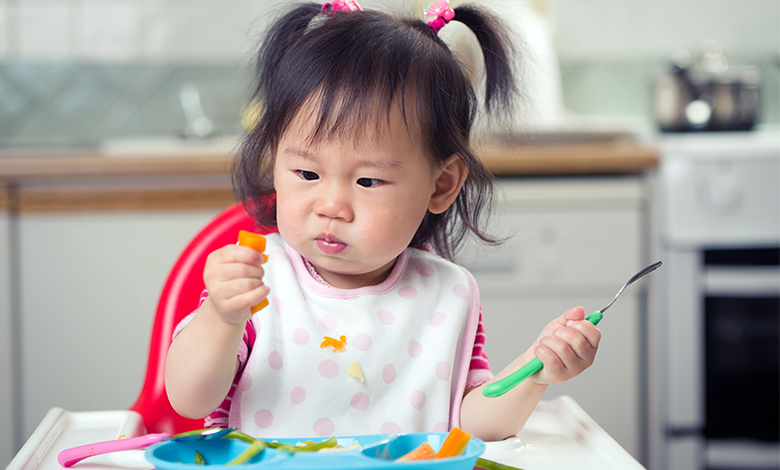- Look for signs your child is interested in your food
- Keep flavours simple and bland to begin with
- Let your little one take the lead
Feeding solids to your baby: when and what to feed them

Key points
At around 6 months old (but not before 4 months), your little one will start to show signs that they’re ready to introduce solids to their diet. It’s worth remembering that children develop at different stages, so it’s better to look for specific signs than use age as a guide.
The key things to look out for include their ability to hold their head up, to sit unassisted in a high chair and an interest in what you’re eating. For example, they might be open their mouth when you lift up your spoon to eat or they might try and grab at your plate.
First things first
When starting with solids, opt for iron-rich foods like pureed red meat or chicken. You could also puree lentils, or offer iron-fortified baby cereals. You should try and incorporate a wide variety of foods in your baby’s diet, so include things like pureed carrots, pumpkin, banana, avocado and yoghurt. Children like bland food, so they don’t need any added sugar or salt.
Be mindful of not excluding allergens – including fish, nut butter and cooked eggs – unless you know your child is allergic. Otherwise, include them in their diet twice a week as current research shows it can help reduce the risk of them developing allergies in later life. If there is any sign of an adverse reaction, stop including that food and seek medical advice.
Keep things simple
Start your little one off with just one or 2 teaspoons of pureed food a day. In an infant’s first year, breast milk or formula is still the most important form of nutrition, so continue to offer milk before food until your little one is around 8 months old. Every child is different and the speed with which they take to solids will vary. Some will devour it from day one, and others will take a while longer. Keep offering a variety of foods and don’t discount ones they’ve refused previously; it might just take some time.
Build slowly
After your baby has been eating pureed spoonfuls of food for a few months, you can move on to mashed and chopped soft foods. As soon as they’re able to pick up the spoon, let them try to feed themselves. Don’t worry if they get food all over their face, because that’s how they’ll learn about taste and texture.When your little one is able to pick them up and chew, you can switch to finger foods.
Recognise the signs they’ve had enough
When feeding your baby, you might notice them looking around or trying to push the spoon away from their mouths. Don’t worry, this just means they’re getting full. Your little one can only have small amounts of food to start with, so let them lead the way.

Get in touch with our Careline experts
When your little one is unhappy or unwell you want reliable support from a trusted source. Our Careline team of nutritionists, dietitians and midwives specialise in infant and child health, offering free nutrition, feeding and product information.
Related pages
Every feeding journey is unique
Not every parent can produce breast milk. No matter what choice you make, we will support your unique feeding journey.
We at Nutricia believe in providing the best nutrition for babies, which is why we recognise breast milk is uniquely superior for babies as it provides many benefits. It is important that mums have a healthy diet to support breastfeeding. A decision not to breastfeed, or partial bottle feed, may reduce breast milk supply making it difficult to reverse. The cost and social implications of using feeding methods should be considered. Always seek professional advice about feeding your baby. Ensure formula is used as directed as improper use can affect baby’s health.
REMEMBER: The information on this page is general only. If you have any concerns about your baby’s poo or questions about constipation or any other health concerns, please speak to a healthcare professional, like a Pharmacist, GP or Maternal Child Health Nurse.



